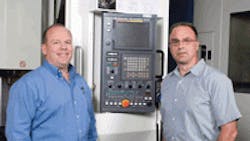After Near-Collapse, Contract Manufacturer Revitalizes Business
Sometimes it takes dramatic moments to inspire change. For EF Precision Group, a manufacturer based out of the Philadelphia area, that moment arrived when 85% of its business was summarily shipped overseas.
Its a familiar storyline: a mom and pop machine shop is nurtured into a full-fledged moneymaker, only to watch its largest customer fly the coupe, leaving its dwindling revenues in the wake.
But EF, which consists of two companies, EF Precision and EF Precision Assembly, defies this common manufacturing tale of woe because over the last 10 years, it has not only revitalized its business, but has forged a path into advanced new industries, producing parts used in fighter jets and racing bikes, while assembling machinery used in supermarkets and dentist offices.
Between 2005 and 2008, EF grew 57% and expects to see its revenue top $20 million in 2010, with customers ranging from Johnson & Johnson, to Lockheed Martin and Northrop Grumman. But that growth comes following several near-death experiences.
Part of the problem, says Bud Tyler, EFs vice president for new business development, was how EF identified itself.
Our company had become not a sales-driven company, but a manufacturing company, says Tyler, who runs EF Precision Group with Bill Pennecale, vice president of operations. We actually took [K&Ss] product as if it were our own and manufactured it. It left us vulnerable. And we needed to regroup and diversify into other industries.
So began a six-year odyssey to steer the company into a more balanced, resilient structure. The first step, says Tyler, was using the groups primary strengths precision and quality manufacturing, along with advanced assembly to lure more business from existing customers, while expanding its broader appeal.
EF had for many years had small pieces of business in defense and the medical industry, but slowly began cultivating that base. The group hired a new sales representative and realigned its staff. By 2006, those efforts began to pay off, as EFs business flourished.
One of the key lessons was recognizing that new customers are instinctively at first going to be skittish. The key, says Tyler, is removing their reasons for saying no. For example, EF has been a Food and Drug Administration-registered contract manufacturer since 1997, but it wasnt ISO 9001:2000 certified. To allay customers, EF received the certification last year, and recently had its quality-management system certified to meet the aerospace industrys AS9100 standard.
Another key is investing aggressively in new advanced capital equipment. Currently, EF has 50 CNC machines a dozen of which have been purchased in the last 18 months alone.
When things began turning bad in the economy, one thing we didnt do was shy away from being aggressive in buying new machinery, says Tyler. A lot of companies tend to hunker down and play it safe. But we make sure our customers see that we can handle the tight tolerances that theyre asking us to produce their parts at.
EF has also recently opened a prototype shop, which features an intuitive lathe and mill that can be operated manually, but will memorize the data and record how to produce a specific part then transfer the information to a CNC machine for larger production runs.
Its a remarkable evolution for a company that nearly folded twice in a six-year span.
The people who run the machines in the shop and who put the assemblies together, they basically havent changed, says Tyler. What has changed is the flow of business and the direction of the industries weve chosen to build with.
Theres that adage that the harder you work, the luckier you are, he adds. Sometimes Id rather be lucky than good. Because weve been very fortunate.
